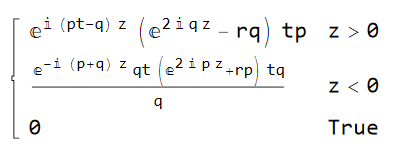I define the following piecewise functions.
Element[{p, pt, q, qt, rp, rq, tp, tq}, Reals]
\[Chi]Rp = Piecewise[{{Exp[I p z] + rp Exp[-I p z], z < 0}, {tp Exp[I pt z], z > 0}}];
\[Chi]Lp = Piecewise[{{pt/p tp Exp[I p z], z < 0}, {-rp Exp[I p z] + Exp[-I p z], z > 0}}];
\[Chi]Rq = Piecewise[{{Exp[I q z] + rq Exp[-I q z], z < 0}, {tq Exp[I qt z], z > 0}}];
\[Chi]Lq = Piecewise[{{qt/q tq Exp[I q z], z < 0}, {-rq Exp[I q z] + Exp[-I q z], z > 0}}];
FullSimplify[PiecewiseExpand[\[Chi]Rp SuperStar[\[Chi]Lq]], Assumptions -> {Element[{p, pt, q, qt, rp, rq, tp, tq}, Reals]}]
Mathematica returns the following
Is there a way I can instruct it to apply the complex conjugation only to the exponential ($i\rightarrow -i $) and also join the exponentials into one?
This is a is a simple example. I need automation to deal with much more complicated examples.


